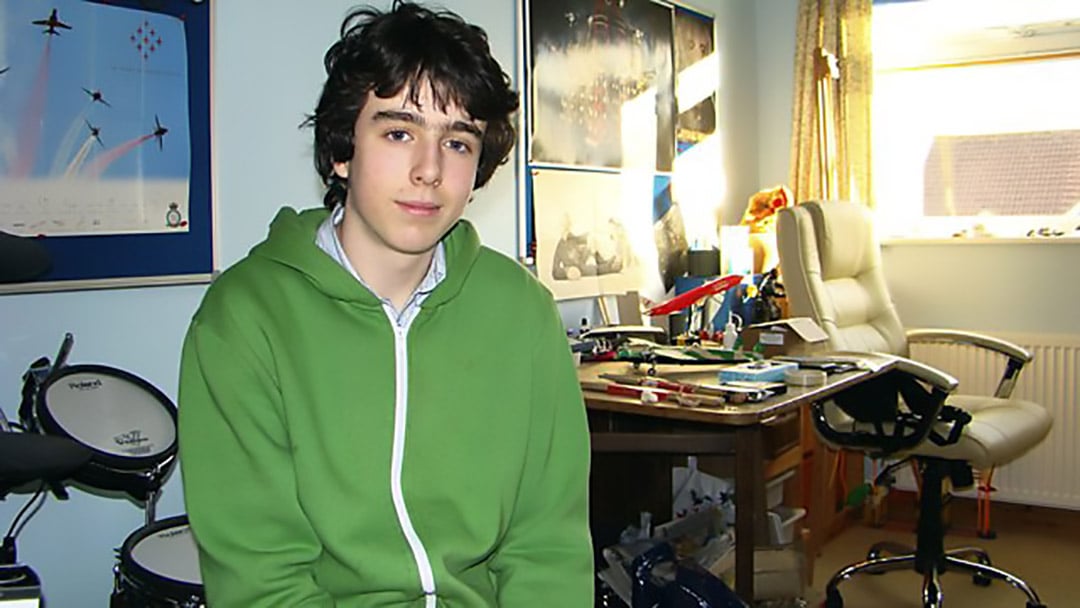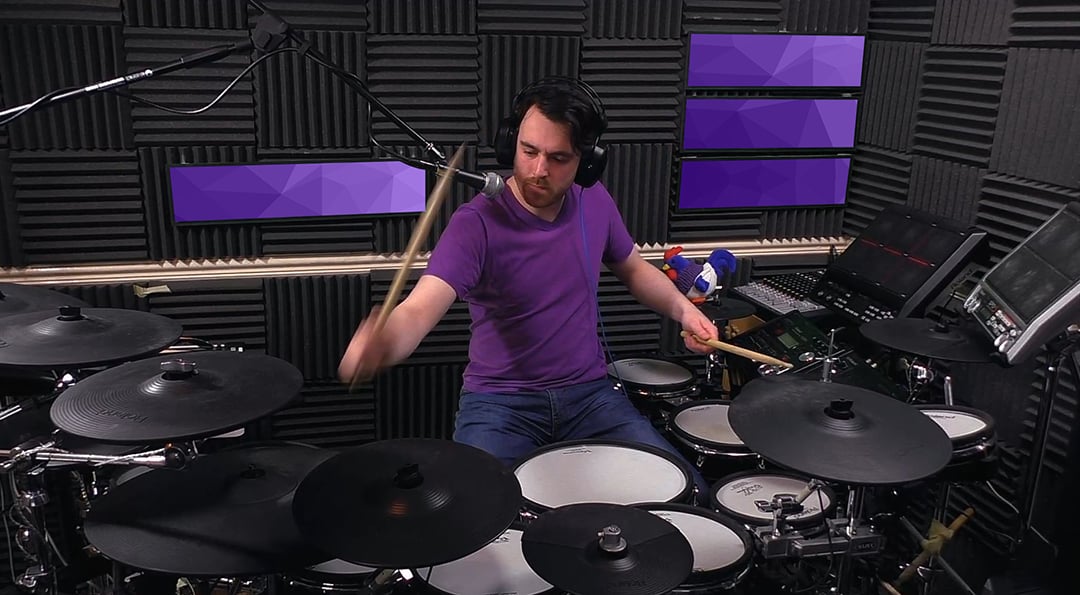
If you’re a drummer and avid Twitch user, you may be familiar with Mrgregles, a 26-year-old drummer-entertainer from Stoke-on-Trent, UK who live streams while playing to various songs, taking requests and making people laugh.
A solid drummer with a technology background, Greg has set up his channel to let paid subscribers interact with his stream in unique ways, like controlling camera shots and graphics – just some of the many ways he stands out on the platform.
Before he found success on Twitch, Greg was working at a local supermarket doing artwork on the side after his tech business collapsed. He’d been streaming for about two years for fun. One day, while drumming on Twitch, “out of nowhere, 17,000 people dropped into my channel.” A popular French streamer had told his followers to check out Mrgregles.
“I got 10,000 followers in 10 minutes. I went from streaming to about 80 people, to 500 people. That catapulted my channel and allowed me to become a partner on the platform, and about two-and-a-half weeks later I went full time.”
Now, aside from being a great drummer, a talented entertainer and a technology wiz, there’s one more thing you should know about Greg. He has Tourette syndrome, a tic disorder that causes involuntary muscle or vocal movements. While it can subside or improve with age, many adults still struggle with symptoms.
Diagnosed at age five, he was told he had “the worst kind of Tourette’s. It can make me jerk, I’ve stabbed my hand with knives, screamed, shouted profanities…it can be really bad.” His father and sister also had a mild form of the syndrome, whose cause is not entirely understood, though it may be related to misfiring synapses in the brain.
“People with Tourette syndrome usually expend four times the amount of energy per day that a normal human would. Our bodies have to eat more to keep up with the involuntary reactions. I would find it hard to put on weight because my metabolism is very jacked up.” In Greg’s opinion, unless a doctor is a specialist in the condition, they may not have the time or resources to address the cause without drugs that only treat some of the symptoms. His negative experience with medications led him to pursue more of a ‘mind over matter’ approach.
As a young teen, Greg realized that certain activities – like art or rollerblading – could alleviate some of the symptoms. The BBC even documented his progress for a few years. He remembers seeing a kid drumming at school, which inspired him to ask his parents for lessons. They picked up an electronic kit, and what happened next caught him completely off guard.
“The first time I sat down on the kit, the symptoms totally went away. Disappeared. I cried. It was the first time in 14 or 15 years that I hadn’t had the symptoms. From that point on, I was drumming as much as I possibly could.”
For those who don’t have Tourette syndrome, it’s hard to imagine being in Greg’s shoes. A tic is an action that can’t really be controlled; it can only be suppressed. Greg describes holding back tics like “adding them to a bag, where eventually the bag will split or overflow and explode. When you’re suppressing a tic, you’ve got a lorry heading toward a brick wall and you have to build a wall strong enough to stop that truck. Suppression is uncomfortable and I’d have hours of physical and mental pain later on as a result.”
When he realized that playing drums didn’t suppress his tics, but rather made them disappear, the relief was overwhelming. It was the first time in years that the ‘person with a megaphone yelling constantly’ on his shoulder went away. “The despair I used to get every time I would tic, all these emotions, all that baggage suddenly up and left.”

Drumming didn’t come naturally to Greg, and he had to mostly teach himself in the beginning. People insulted his playing and he found it hard. “The one who turned that around was my current drum teacher, Craig Blundell [who’s worked with artists like Steve Hackett of Genesis and Steven Wilson of Porcupine Tree]. I met him at a music shop when I was 15 or 16. He’s always spoken out about how he has awful stage fright. After our conversation, he gave me a stand! That kind generosity after having so little confidence in my own drumming sort of gave me a boost. I don’t care about my tics or what people think; I’m going to do that performance in the talent show at school. I got a standing ovation.
“The reason I mention this is if you have an idol or a positive role model, use it. People can be supportive whilst the world seems so harsh. There are people out there who can see what you see.”
Greg has managed to adapt around his challenges. His first drum teacher even found a way to help him get past his visual dyslexia, which makes it difficult to read black on white: he would photocopy everything in green. Drumming quickly became a way to eliminate both the tics and the stress of suppressing them. While this discovery was life-changing for Greg, there was one catch: the symptoms would come back as soon as he’d finish playing.
“I started thinking, how could I change that? So when I wasn’t drumming, I started to tap on desks – which really annoyed people – and my knees. I wondered, what is actually making the Tourette’s stop? Is it the mental concentration or the physical action of drumming?
“I came to the conclusion that it was the concentration. The brain power I needed to drum essentially used up the brain power the Tourette’s needed to function. Over the years, I taught myself to constantly multitask and drum in the back of my head. Right now, I’m playing ‘Smells Like Teen Spirit.’ It took a good eight years of practice before I could do this and still do everything normally in my day-to-day life. As you can imagine, trying to have a conversation and imagine drumming in my mind was very taxing at first, but the results were so positive I just forced it through. Now I can be almost totally Tourette’s free.”
Greg says he now has more energy because his body is no longer expending it through tics. He can concentrate for longer periods of time, can run faster, and can even have energy left after 12-hour, nonstop charity drum streams on his Twitch channel.

Greg’s personal discovery has changed his life for the better, but it begs the question: is he an outlier – a miracle – or could others in his boat also use drumming to control or eliminate their symptoms? Curious if he could replicate his mental distraction techniques, Greg taught them to a girl from Ireland who’d reached out after experiencing similar relief when playing accordion. After a few virtual meetings, she learned to visualize the act of playing her favorite Irish jigs, and now she’s almost symptom-free.
Dr. Jeremy Stern, Consultant Neurologist at Frimley Park Hospital and Honorary Medical Advisor to UK charity Tourettes Action, believes that there may be something to this.
“The tics (twitches and noises) of Tourette syndrome vary a lot according to the activity of the brain – so they tend to be worse when stressed or tired and better when absorbed in an activity like sport, video games or music. Many people have found drumming helpful for tics. Enjoying and playing music involves wide areas of the brain. It is possible that the intense control of muscles and rhythm needed in drumming could alter brain activity in a way that stops tics from being expressed. It is fascinating that Greg finds that thinking about drumming alone could control his tics. While this might be a simple distraction technique it is also possible that some of the same brain circuits used when he is actually physically drumming are activating and suppressing tics in the same way.”
While Greg is basically tic-free these days, there are still a few situations where his symptoms are bound to return. One is when he’s with another person who has Tourette’s. “If I stream with sweetanita, who’s known on Twitch for having Tourette’s, we’ll trigger each other. The moment I stop talking to her, it dies back down.” His tics can also come back if he’s sad, angry, or emotional. “I was in the cinema, and at the climax of Avengers: Endgame my Tourette’s came back because I was excited.”
Greg has spent a lot of time speaking publicly about his experiences. If you’re reading this and have Tourette syndrome or a similar neurological condition, here’s his advice to you:


By signing up you’ll also receive our ongoing free lessons and special offers. Don’t worry, we value your privacy and you can unsubscribe at any time.
We use cookies for traffic data and advertising. Cookie Policy »